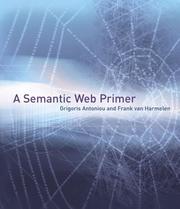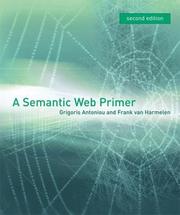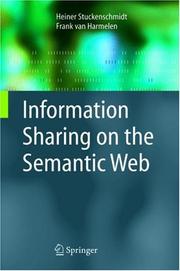| Listing 1 - 7 of 7 |
Sort by
|

ISBN: 9780444522115 0444522115 9780080557021 0080557023 1281144940 9786611144944 Year: 2008 Publisher: Amsterdam : Elsevier,
Abstract | Keywords | Export | Availability | Bookmark
 Loading...
Loading...Choose an application
- Reference Manager
- EndNote
- RefWorks (Direct export to RefWorks)
Knowledge Representation, which lies at the core of Artificial Intelligence, is concerned with encoding knowledge on computers to enable systems to reason automatically. The Handbook of Knowledge Representation is an up-to-date review of twenty-five key topics in knowledge representation, written by the leaders of each field.This book is an essential resource for students, researchers and practitioners in all areas of Artificial Intelligence.* Make your computer smarter* Handle qualitative and uncertain information* Improve computational tractability to solve yo

ISBN: 0262012103 Year: 2004 Publisher: Cambridge (Mass.) MIT press
Abstract | Keywords | Export | Availability | Bookmark
 Loading...
Loading...Choose an application
- Reference Manager
- EndNote
- RefWorks (Direct export to RefWorks)
Computer architecture. Operating systems --- Semantic Web --- Web sémantique --- Semantic web --- 681.3*C --- 681.3*I24 --- 681.3*H25 --- Semantic integration (Computer systems) --- Semantic networks (Information theory) --- World Wide Web --- Microformats --- Computer systems organization: hardware/software interfaces; instruction set design; system architectures; systems specification methodology --- Knowledge representation formalisms and methods: frames and scripts; predicate logic; relation systems; representation languages; procedural and rule-based representations; semantic networks (Artificial intelligence) --- Heterogeneous databases: data translation; program translation (Database management) --- Semantic Web. --- 681.3*H25 Heterogeneous databases: data translation; program translation (Database management) --- 681.3*I24 Knowledge representation formalisms and methods: frames and scripts; predicate logic; relation systems; representation languages; procedural and rule-based representations; semantic networks (Artificial intelligence) --- 681.3*C Computer systems organization: hardware/software interfaces; instruction set design; system architectures; systems specification methodology --- Web sémantique

ISBN: 9780262012423 0262012421 Year: 2008 Publisher: Cambridge, Mass. : MIT Press,
Abstract | Keywords | Export | Availability | Bookmark
 Loading...
Loading...Choose an application
- Reference Manager
- EndNote
- RefWorks (Direct export to RefWorks)
Computer architecture. Operating systems --- Semantic Web. --- Web sémantique --- Semantic web --- Web sémantique
Book
ISBN: 026210038X Year: 1989 Publisher: Cambridge, MA : M.I.T. Press,
Abstract | Keywords | Export | Availability | Bookmark
 Loading...
Loading...Choose an application
- Reference Manager
- EndNote
- RefWorks (Direct export to RefWorks)
Artificial intelligence. Robotics. Simulation. Graphics --- Expert systems (Computer science) --- Logic programming --- Systèmes experts (Informatique) --- Programmation logique --- Knowledge representation (Information theory) --- 681.3*I24 --- Computer programming --- Representation of knowledge (Information theory) --- Artificial intelligence --- Information theory --- Knowledge-based systems (Computer science) --- Systems, Expert (Computer science) --- Computer systems --- Soft computing --- Knowledge representation formalisms and methods: frames and scripts; predicate logic; relation systems; representation languages; procedural and rule-based representations; semantic networks (Artificial intelligence) --- 681.3*I24 Knowledge representation formalisms and methods: frames and scripts; predicate logic; relation systems; representation languages; procedural and rule-based representations; semantic networks (Artificial intelligence) --- Systèmes experts (Informatique) --- Logic programming. --- Expert systems (computer science)
Book
ISBN: 3319557351 3319557343 Year: 2017 Publisher: Springer Nature
Abstract | Keywords | Export | Availability | Bookmark
 Loading...
Loading...Choose an application
- Reference Manager
- EndNote
- RefWorks (Direct export to RefWorks)
This book is open access under a CC BY-NC 4.0 license. This volume discusses the prospects and evolution of informatics (or computer science), which has become the operating system of our world, and is today seen as the science of the information society. Its artifacts change the world and its methods have an impact on how we think about and perceive the world. Classical computer science is built on the notion of an “abstract” machine, which can be instantiated by software to any concrete problem-solving machine, changing its behavior in response to external and internal states, allowing for self-reflective and “intelligent” behavior. However, current phenomena such as the Web, cyber physical systems or the Internet of Things show us that we might already have gone beyond this idea, exemplifying a metamorphosis from a stand-alone calculator to the global operating system of our society. Thus computer scientists will need to reconsider the foundations of their discipline to realize the full potential of our field. Taking often contradictory developments into consideration, researchers will not be able to tackle specific technological or methodological problems in the future without also a broader reflection on their field. The papers in this book take a first step forward and reflect on these issues from different perspectives. The broad spectrum of topics includes Informatics: a discipline with a (short) history and a high impact Interdisciplinarity: how to do research Ethics: what is our responsibility Diversity: why are there so few women in informatics Combining informatics, history and art: a special contribution. This book is intended for all informatics researchers, in academia as well as in industry. It is our responsibility – not only as scientists but also as citizens – to make the public aware of the dichotomies and dialectic relationships of computer science.
Computer science. --- Research --- Computers. --- Computers and civilization. --- Computer Science. --- Computers and Society. --- History of Computing. --- Diversity Management/Women in Business. --- Research Ethics. --- Moral and ethical aspects. --- Civilization and computers --- Civilization --- Automatic computers --- Automatic data processors --- Computer hardware --- Computing machines (Computers) --- Electronic brains --- Electronic calculating-machines --- Electronic computers --- Hardware, Computer --- Computer systems --- Cybernetics --- Machine theory --- Calculators --- Cyberspace --- Research ethics --- Informatics --- Science --- Diversity in the workplace. --- Research-Moral and ethical aspec. --- Cultural diversity in the workplace --- Cultural diversity in workforce --- Diversity in the workforce --- Diversity in the work place --- Multicultural diversity in the workplace --- Multicultural workforce --- Workforce diversity --- Multiculturalism --- Personnel management --- Research—Moral and ethical aspects. --- Women in computing --- Big data --- Computing ethics

ISBN: 9783540205944 9783642058233 9783540269076 3540205942 Year: 2005 Publisher: Berlin : Springer,
Abstract | Keywords | Export | Availability | Bookmark
 Loading...
Loading...Choose an application
- Reference Manager
- EndNote
- RefWorks (Direct export to RefWorks)
Aboutthebook The success of the information society The rapid progress of the information society in the past decade has been made possible by the removal of many technical barriers. Producing, storing, and transporting information in large quantities are no longer signi?cant problems. Producing on-line, digitized information is no longer a problem. Ever more of our commercial, scienti?c and personal information exchanges happen on-line in digital form. In the professional domain, near 100% of all o?ce documents areproducedindigitalform(evenifafterwardstheyaredistributedinpaper form), large parts of the scienti?c discourse are now taking place in digital form (with physics, computer science and astronomy taking a leading role). In the public domain, newspapers are available on-line, an increasing number of radio and television stations o?er their material on-line in streaming form and e-government is an important theme for public administration. Even in the personal area, information is rapidly moving on-line: sales of digital cameras are now higher then for analogue cameras, e-mail and on-line chat have become important channels for maintaining social relations and for personal entertainment the digital DVD is rapidly replacing the analogue video tape. Compact disk (itself already digital) is under serious pressure from on-line music in MP3 format from a variety of sources. In short: p- ductionofon-lineinformationisnowthenorminvirtuallyallareasofourlife. Storing such information in the required volumes is also no longer a problem.
Information systems --- Semantic web --- Ontologies (Information retrieval) --- Knowledge management --- Semantic integration (Computer systems) --- Information retrieval --- Information organization --- Semantic Web --- Recherche de l'information --- Organisation de l'information --- Web sémantique --- EPUB-LIV-FT LIVINFOR SPRINGER-B --- Knowledge management. --- Ontologies (Information retrieval). --- Semantic Web.
Book
ISBN: 3642397832 3642397840 Year: 2013 Publisher: Berlin, Heidelberg : Springer Berlin Heidelberg : Imprint: Springer,
Abstract | Keywords | Export | Availability | Bookmark
 Loading...
Loading...Choose an application
- Reference Manager
- EndNote
- RefWorks (Direct export to RefWorks)
This volume contains the lecture notes of the 9th Reasoning Web Summer School 2013, held in Mannheim, Germany, in July/August 2013. The 2013 summer school program covered diverse aspects of Web reasoning, ranging from scalable lightweight formalisms such as RDF to more expressive ontology languages based on description logics. It also featured foundational reasoning techniques used in answer set programming and ontology-based data access as well as emerging topics like geo-spatial information handling and reasoning-driven information extraction and integration.
Semantic Web --- Semantic computing --- Engineering & Applied Sciences --- Mechanical Engineering --- Computer Science --- Mechanical Engineering - General --- Information Technology --- Artificial Intelligence --- Computer science. --- Mathematical logic. --- Database management. --- Artificial intelligence. --- Computer Science. --- Artificial Intelligence (incl. Robotics). --- Database Management. --- Mathematical Logic and Formal Languages. --- Computer science --- Electronic data processing --- Semantics --- Artificial Intelligence. --- Data base management --- Data services (Database management) --- Database management services --- DBMS (Computer science) --- Generalized data management systems --- Services, Database management --- Systems, Database management --- Systems, Generalized database management --- Informatics --- Science --- AI (Artificial intelligence) --- Artificial thinking --- Electronic brains --- Intellectronics --- Intelligence, Artificial --- Intelligent machines --- Machine intelligence --- Thinking, Artificial --- Bionics --- Cognitive science --- Digital computer simulation --- Logic machines --- Machine theory --- Self-organizing systems --- Simulation methods --- Fifth generation computers --- Neural computers --- Algebra of logic --- Logic, Universal --- Mathematical logic --- Symbolic and mathematical logic --- Symbolic logic --- Mathematics --- Algebra, Abstract --- Metamathematics --- Set theory --- Syllogism --- Reasoning web
| Listing 1 - 7 of 7 |
Sort by
|

 Search
Search Feedback
Feedback About
About Help
Help News
News